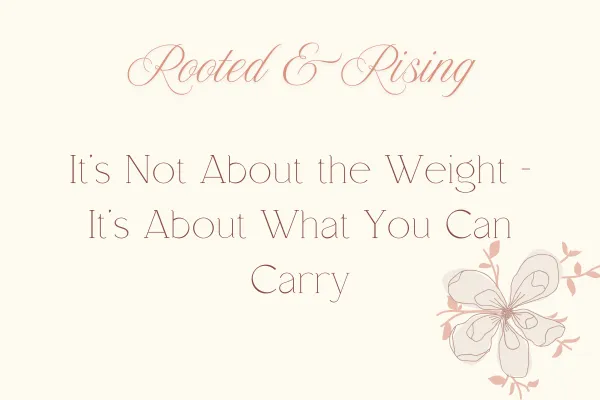
It's Not About the Weight—It's About What You Can Carry
Have you ever looked at someone and thought, “If I just weighed what she does, I’d feel so much better”?
Recently a thought struck me after meeting with a client, who was upset about her constant struggle with her weight:
A person who weighs 100 pounds doesn’t necessarily move through life more easily than someone who weighs 250.
Why? Because it’s not about the number.
It’s about how well your body can carry you.
Strength isn’t about size.
A 100-pound person with no muscle tone, no energy, and poor sleep might struggle far more than a 250-pound person who eats well, moves often, and feels strong in his or her skin.
The scale tells you something, but it doesn’t tell you the whole story.
What really matters is whether your body feels supported, energized, and steady—whether it can carry you through your day, your stress, and your responsibilities.
After having these thoughts, I started to think about what you can’t see, applying that truth to our spirit and mental health.
Some people carry heavy emotional and mental loads—grief, stress, heartbreak, responsibilities—and still move through life with grounded strength. Others may have fewer external pressures but feel completely overwhelmed by the smallest inconvenience.
It’s all relative to how strong your mind and spirit are.
Just like we train the body, we need to train the nervous system, mind, and spirit too.
So how do we build inner strength?
It’s not always dramatic or time-consuming.
In fact, the most powerful practices are incredibly simple:
It comes down to breathwork (signals safety to your nervous system), meditation (calms the mental clutter), and prayer (grounds you in truth, purpose and peace).
When done daily, these aren’t just crisis tools. They’re your resilience practice.
They reset your nervous system.
They improve your sleep.
They enhance immunity and support cardiovascular health.
And best of all?
They're free.
And getting started is simpler than you think.
If breathwork is new to you, try this: Set a timer for 5 minutes. Breathe in slowly through your nose for 3 seconds. Breathe out gently through your nose for 6 seconds. That’s it. No fancy music, app, or props required. But if it helps you relax, you can put on some calming music or sit outside and let nature be your soundtrack. You can do this lying in bed in the morning to start your day with calm, or at night to lull yourself into a restful sleep.
Think of breathwork like weight training—not for your biceps or glutes, but for your nervous system and your mind.
Every time you breathe intentionally, you’re building internal strength. You're improving your heart rate variability (HRV), which is a key marker of your body’s resilience. Higher HRV is linked to better emotional regulation, improved focus, deeper sleep, stronger immunity, and even better cardiovascular health. And the best part? You can begin to improve it in just minutes a day.
Over time, this small daily practice creates profound change.
Just like lifting weights gradually builds physical strength, breathwork conditions your body to recover from stress more quickly, think more clearly, and stay grounded when life gets hard. It trains your brain and body to respond with steadiness, not panic—to pause instead of spiral.
So the next time you feel overwhelmed, off-center, or like your body just isn’t cooperating, remember this:
Resilience isn’t something you either have or don’t have.
It’s something you practice.
And breath by breath, you can become stronger - mentally, spiritually and physiologically.
